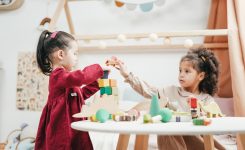Uncategorized
The Importance of Building Your Child’s Social Circle
Please attribute to Carla Buck – Play:Date Expert on Child Behavior and Founder at Warrior Brain
Your child has come home from school again in tears. All she can say is that she has “no friends.” You desperately want your child to feel like she belongs. But she has real trouble making and keeping friendships at school. As a parent, you know how hard this can be. It’s incredibly difficult and takes a lot of courage to pick up the phone and call or message someone to arrange a play date for your child.
One of childhood’s most challenging lessons is to learn how to be a good friend. Some anxious and shy children find it really hard to face their fears. Especially when it comes to making new friends. Your child desperately wants to be accepted. To fit in. To truly belong. But their “what if” thoughts, like “what if she doesn’t like me” stops them from being brave. Some help and encouragement from you as the parent can make the world of difference to your worries and fears for your child, and also to theirs.
Understanding why Friendships are Important
Friendships add to your child’s social skill learning is a HUGE way. Such as learning to be aware of someone else’s view point or standing in their shoes so to speak. Learning the rules of how to have a conversation like how to begin one and when to know a conversation is coming to an end. And also learning age appropriate behaviors. It is often the case that children that need help with emotional behavioral problems have no friends or find it very difficult to play with other children.
“Friends also have a powerful influence on a child’s positive and negative school performance and may also help to encourage or discourage deviant behaviors,” Dr. Paul Schwartz says, a professor of Psychology and Child Behavior Expert. “Compared to children who lack friends, children with ‘good’ friends have higher self-esteem, act more socially, can cope with life stresses and transitions, and are also less victimized by peers.”
Before you get your knickers is a twist mama, there is good news! It’s important to understand that these social skills can be learned in a number of ways and at a number of ages. There is no one size fits all magic wand swoosh for figuring out friendships. Children thrive socially over Minecraft as much as they do when pretending to be their favorite animals. There are ways to help children develop these relationship skills that will help them have valuable and meaningful connections with others.
Here are some things you can do to help your child:
Modeling What It Means To Be A Good Friend:
Help figure out where your child struggles the most when making friends. Think to yourself, “what is one skill she doesn’t have and how can I help her learn it?” If it’s learning how to say what she feels, model it for her by teaching her the “I feel (feeling) because (reason)” technique. E.g. “I feel sad when you don’t tell me about your day. How do you feel when I don’t tell you about my day?” The more you model this, and feed into your own friendships and talk openly about why you choose to do what you do, the more this will help model what it means to have a meaningful friendship to your child.
Creating Friendship Goals:
Being intentional about which friendships you really want will help you know where your energy is best invested. If you took a step back, and decided which friendships were truly valuable to you, you will know exactly which people to invest your time in and why. Ask your child which friend they want to have a really good friendship with. Set a goal such as “ask friend to sleep over twice this month” or “say hi every morning”. If this friend is at a different school, plan to meet up over the weekends this month. This can be a very scary step for some children. Praise their efforts and remember your ultimate goal when you just want to sleep in on a Friday morning, but you CHOOSE to drive across town for a play date instead!
Setting Up Play Dates:
Play dates often mean a massive grass stain on your child’s new shirt or mud dragged into your villa just after it got cleaned. And your lounge suddenly looks like Christmas morning with toys EVERYWHERE. It’s important to remember this is all a part of your child’s social development. A simple tea party with each other and all those teddy bears can teach affection, empathy, negotiation and appreciating someone else’s perspective. “By interacting with their peers, children begin to learn about perspective taking, where they can realize how others may have different thoughts and feelings,” says Dr Theodote Pontikes from Loyola University in Chicago.
Where to Start:
Start by inviting only 1 child. This helps your child feel more confident as they try out what it means to be a good friend. Remember, just like they test the boundaries at home with you, they will test the boundaries of a friendship too. It’s totally normal for tears and frustrations and “Deanna said she doesn’t want to be my friend anymore.” This is how your child learns what friendship means. A simple sorry can be all that’s needed for the two of them to be best friends again.
Be accessible. And get involved only when asked. Remember, it’s your child that is socializing and learning about empathy and how to get along in society. Not you! Be in the background. Prepare some fun snacks and be ready to listen when they ask you to. May the odds be ever in your favor Mama!









